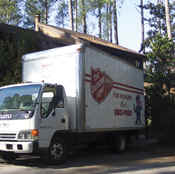The
Mechanics of Moving a Mountain
Making
a change of address later in life can feel like trying to move a
mountain
for both seniors and their families.
by
Rebecca Wise Potter, Contributing Writer
|

With
the lion's share of the work finally behind us, we took a
long-awaited trip to the beach. Photo of Becky Potter and her
mother, Nita Wise.
|
When my father passed away in January of
2005, the monster that had plagued me for years grew a new head.
I had long been concerned for the safety
of my aging parents, who lived alone in a large home on 58 secluded acres.
Both had debilitating health problems. My father had begun to experience
periods of dementia. My mother�s mobility had been limited by a stroke 14
years earlier; it was getting increasingly difficult for her to walk.
There was no family member nearby. My
parents had moved to their home outside Clemson, S.C., after my brothers and
I had left the nest; we knew their friends and neighbors only peripherally.
My oldest brother, who lived closest in Columbia, S.C., was nearly three
hours away. Another brother was 2,000 miles west in Colorado, and I was a
7-plus-hour-drive away in Virginia. Our parents were fiercely independent,
and my attempts at persuading them to hire help had been repeatedly
thwarted. I came to know the 450 miles between our homes intimately.
Through all this, I found solace in the
fact that they had each other. It was unlikely they would both be
incapacitated at the same time. There was always someone to call for help.
All too suddenly, that safety net
disappeared. My father was diagnosed with terminal brain cancer, and in less
than a month, he was gone. During that brief time, the conversations my
brothers and I had with mom about what she would do after dad passed away
were half-hearted and unfocused. We were too consumed with grief to think
about the future.
|

The
Salvation Army was key. These fellows made four separate trips to
the house within a week. |
After the funeral, trying to convince my
mother to come home with me was futile. She needed time to be alone; she
wasn�t budging. I understood, but that was of little comfort. We had a
Lifeline system installed and called daily, but still, we worried.
When a rarely available property in the
section of small, low-maintenance patio homes in my brother�s Columbia
neighborhood came on the market soon after dad�s death, even my mother
thought that perhaps it was meant to be. My brother had casually mentioned
to a neighbor to let him know if he ever heard that one of these homes was
going up for sale. In less than 48 hours, he got a call back saying,
�You�re not going to believe this, but ...�
The little house was immaculate and had
a screened porch on the back that faced a large expanse of protected
wetlands. Not the private, pine sanctuary mom had grown accustomed to, but a
definite plus. It had a single-car garage, a huge attic, and ample closet
space � all important factors, considering she would be moving from a much
larger home. Even though we knew that significant paring down was necessary,
it would be nice to have decent storage space so that it didn�t have to
happen all at once.
Much to our delight (and relief), mom
decided to buy the house, with the understanding that she would not move
right away. She had read somewhere that one should wait a year before making
a major decision after a life-changing event, and considered it sage advice.
She tentatively set October as her goal. She was in the fortunate position
of not needing to sell her Clemson home right away, and would hunker down
until her fear of driving in winter weather forced her hand. My brothers and
I weren�t particularly comfortable with this decision, but had learned
that pushing too hard was counterproductive.
In the months that ensued, dealing with
my father�s estate became a daunting task. Mom, who had little to do with
their finances while dad was alive, was overwhelmed by paperwork. She
worried much, slept little, and began to sound defeated. She hadn�t made a
move towards making a move; it was all she could do to make the 100-yard
trip to the mailbox and try to decipher its contents. I began to worry that
it would all become too much, that the thought of sifting through 76 years
of accumulated memorabilia would paralyze her. In an effort to get the ball
rolling, I did an Internet search for moving companies in her area. I could
at least start by getting some estimates.
What I discovered was that there were
very few moving dates left available between then and October, and even
fewer that worked out for me to be there. I finally convinced mom to let me
go ahead and hire a moving company to take what furniture she wanted to her
new home the following week, when I could be there to help her. I would take
the seats out of my mini-van and fill it with boxes; we could pack some
dishes and clothing, odds and ends. We could stay a few days in her new
home; we�d have fun decorating. We would leave enough in her Clemson home
so that she could live comfortably in either place. She could decide whether
she wanted to stay in Columbia, and if not, I would bring her back.
Helping elderly parents downsize for a
move can be a grueling, emotionally charged experience. With the right
attitude, it can also be a wonderful time for reminiscing and bonding. With
that in mind, I offer the following five tips, gleaned from my own
experience.
1. Allow as much time as
you can possibly afford. Elderly parents may need to move slowly, both
physically and in sorting out ideas and making decisions. Know this going
in, and try to move at their pace. Impatience adds to the stress and
confusion. Take the time to pause and share your memories as you sort
through your family history. Listen to some music you both enjoy while you
work. Mom and I cranked up the country station, and had a good laugh every
time we heard �Tequila Makes Her Clothes Fall Off.� We also played some
old children�s records we unearthed, and were amazed to find we both
remembered nearly every word.
2. Your parent(s) should
choose what they want to take. Be respectful of their decisions. Resist the
urge to dictate what stays and what goes. If your parents are in charge of
what is discarded, they likely will feel better about the process. Even
though you may feel certain they won�t need 10 years� worth of bank
statements, it will be less stressful to box, label, and store such items to
be sorted out at a later date.
Encourage your parent(s) to
choose their favorite things, regardless of monetary value. Things that have
a family history have sentimental value that is priceless. We decorated the
second bedroom in mom�s new home with beloved items from her own
childhood, and named it the West Virginia Room.
3. Whenever possible,
enlist the help of local charities, and remind your parent(s) of the many
less fortunate folks they will help with their donations. The Salvation Army
was a godsend during our move. Not only will they pick up at your home, they
will carry out furniture and large items. Keeping in mind that your discards
have the potential to change the lives of people in the midst of tragedy
makes parting with them that much easier.
4. Suggest that your
parent(s) make a list of special friends and neighbors for whom they might
like to select some items as gifts. Look around for baskets, bowls, hats,
even boots � use your imagination! � in which to arrange the items as
gift packages. Ask your parent(s) to write a note to go with each that
includes their new address and phone number. With my mother�s creative
flair, generous nature and limited mobility, this was a job that lifted her
spirits and one that she could do sitting down.
5. Work together, and pack
up rooms one at a time,
labeling boxes with the room/drawer/shelf/closet their contents came from.
This is something mom and I didn�t do, and in hindsight I feel would have
been a better way to organize. By packing up one room at a time, you have a
plan of attack and a sense of accomplishment when each room is complete. By
working in the same room, you avoid having to shout across the house and the
travel time required when you discover those treasures you just can�t WAIT
to show each other. The idea of packing items in boxes according to where
they came from rather than reorganizing stems from the fact that my mother
can often remember where something was in her old house, but has no idea
which box it ended up in.
Above all, don�t lose your sense of
humor! My mother and I rolled into her new neighborhood with my mini-van
packed to the gills. We hadn�t showered in days and were punch-drunk from
lack of sleep. As we staggered from our Beverly Hillbillyesque vehicle, we
wondered out loud what the neighbors were going to think. That thought sent
us into hysterics that surely confirmed any misgivings they may have already
had! But it was a moment we will both remember and cherish for years to
come.